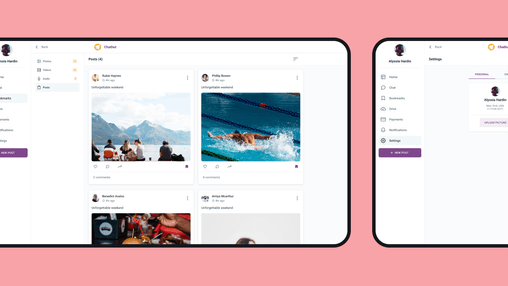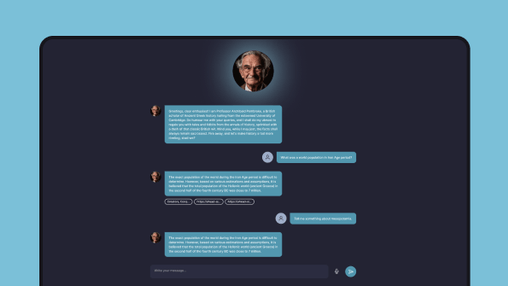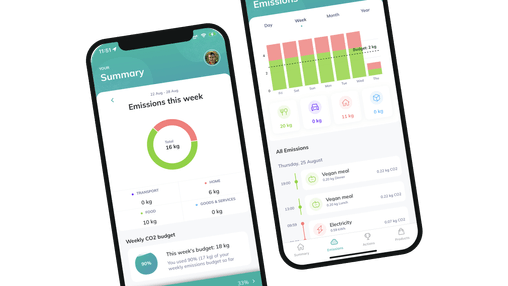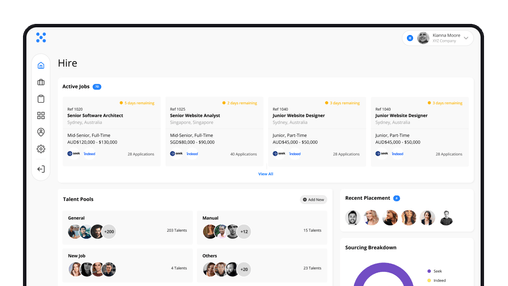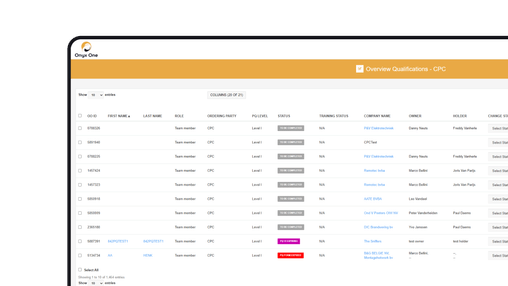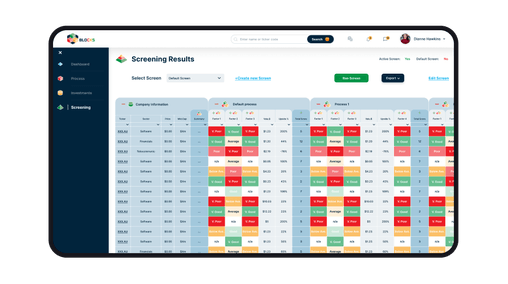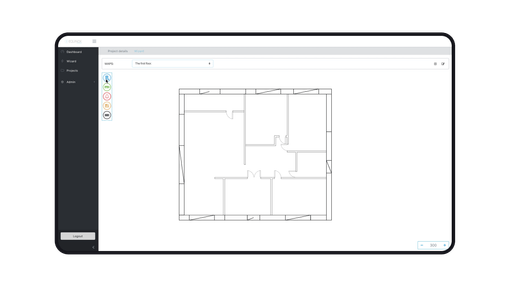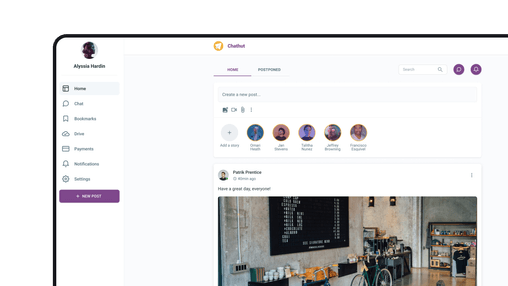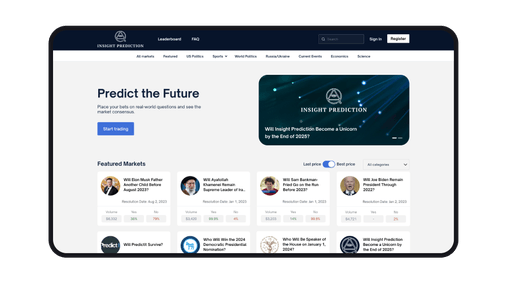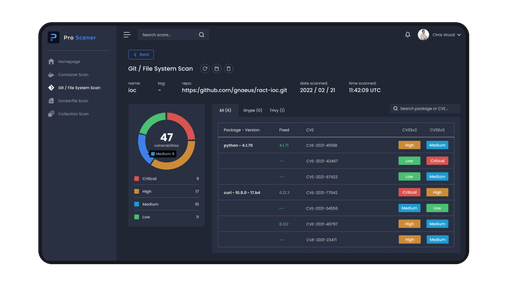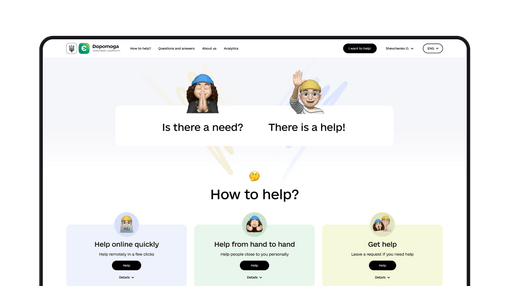Introduction
In recent years, the rise of remote work has transformed the way businesses operate, allowing for greater flexibility, reduced overhead costs, and access to a more diverse pool of talent. Remote development teams, in particular, have become increasingly popular, as they enable companies to tap into the expertise of skilled developers from around the world. However, working with a remote team can also present unique challenges, especially when team members are dispersed across different timezones.
During 2019 the outsourcing market saw $92.5 billion worth of services, growing at a significant annual rate of 8%.
Maximize Market Research reported that the Business Process Outsourcing (BPO) Market size has reached USD 169.763 Billion in 2021 and the total Business Process Outsourcing (BPO) revenue is expected to grow at a CAGR of 7.09% from 2022 to 2029, reaching nearly USD 293.650 Billion.
Top companies from Fortune Global 500 outsource their work. In USA exclusively, 66% of businesses outsource at least one department and roughly 300,000 U.S. jobs.
Most Commonly Outsourced
In this article, we will discuss strategies and best practices for effectively working with remote development teams in different timezones. By selecting the right tools, establishing clear expectations, and fostering a collaborative and supportive environment, you can overcome the challenges posed by timezone differences and leverage the benefits of remote work to achieve your goals.
Benefits of remote team
The growing popularity of remote development teams can be attributed to the numerous advantages they offer to businesses. By embracing remote work, companies can unlock the following benefits:
Access to a global talent pool
Remote work allows businesses to recruit skilled developers from around the world, without being limited by geographical boundaries.
Cost savings
Remote teams can help businesses save on overhead costs, such as office space, utilities, and maintenance. Furthermore, direct cost (salary) usually less overseas.
Flexibility and scalability
Remote teams enable businesses to scale their development capabilities up or down as needed, making it easier to adapt to changing market conditions. Again, scaling remote team is saving cost compare to the same operation with onshore team.
Diverse perspectives
Working with a geographically dispersed team brings together individuals with different backgrounds and experiences, leading to more innovative and well-rounded solutions.
Follow-the-sun model
By leveraging timezone differences, businesses can implement a follow-the-sun model, allowing for round-the-clock development and faster project turnaround times (time to market).
Embracing remote development teams can provide businesses with an array of advantages, from cost savings to access to a global talent pool. By implementing effective strategies to manage timezone differences, companies can fully capitalize on these benefits to drive success and optimizng cost.
Challenges posed by working with remote teams
Despite the numerous and apparent advantages of remote teams, working across different timezones can present some challenges that need to be addressed in order to ensure smooth collaboration and exploit benefits to full potential. Here are Common of these challenges include:
- Communication difficulties: Timezone differences can make it challenging to schedule real-time meetings, potentially leading to miscommunication and delays.
- Reduced visibility: Remote team members may not have the same level of visibility as their in-office counterparts, making it harder for managers to monitor progress and provide support.
- Collaboration issues: Timezone differences can make it difficult to collaborate on tasks that require real-time input from multiple team members, potentially hindering progress. And deadlines across different timezones can be complex and may require some team members to work outside of their regular hours.
- Cultural differences: Remote teams often include members from diverse backgrounds, which can lead to misunderstandings and challenges in navigating cultural nuances.
- Maintaining team cohesion: Building a strong team dynamic can be more challenging when team members are working remotely and dispersed across different timezones.
By acknowledging and proactively addressing these challenges, businesses can develop strategies to effectively manage their remote development teams, ensuring that the benefits of remote work outweigh the potential obstacles.
Fortunately, these challenges are not insurmountable and can be effectively managed with the right strategies and tools. In the sections below, we will provide practical solutions and tips to help you navigate timezone differences and create a successful remote development team environment.
Mastering Remote Collaboration: Strategies and Tools for Success
In this section, we will anatomize various approaches to help you overcome the challenges associated with remote teams in different timezones, from selecting the right communication and collaboration tools, to fostering a supportive work environment and ensuring accountability.
By implementing these strategies, you can create a cohesive and efficient remote team that thrives despite the geographical distance and timezone disparities.
These recommendations are based on our experience providing services to clients across different timezones and cultures, including Australia, the United States, the United Kingdom, Canada, Europe, and the United Arab Emirates. By leveraging insights from these diverse engagements, we aim to offer you practical strategies to help get the most out of working with remote team. Note, setting things right from the very beginning will save you both time and budget in the long run.
Selecting the Right Tools for Communication and Collaboration
Effective communication and collaboration are essential when managing remote teams, particularly those spread across different timezones. Choosing the right tools will streamline workflows, enhance productivity, and keep your team connected despite the distance. It is crucial that all team members have full access to these tools, can work on them regardless of their timezone, and collaborate effectively to ensure your team works as a unified group towards the set goal.
Communication tools
Our pick - Slack
A popular team communication platform that offers real-time messaging, file sharing, and integration with various productivity tools, ability to create bots. It also incorporates video/audio calls, screen sharing and other perks all in one app.
Microsoft Teams
A comprehensive communication and collaboration platform that integrates seamlessly with other Microsoft Office products. Teams provide chat, video conferencing, file sharing, and collaboration features, making it a one-stop solution for remote teams.
Project management tools
Having an effective project management system is essential. Project management tools help keep track of all tasks, plan work, and monitor progress, ensuring that projects stay on schedule and all team members remain aligned with their responsibilities. These tools can also facilitate communication and collaboration, making it easier to address any issues or obstacles that arise during the development process. By selecting the right project management tool for your team, you can promote a more organized, efficient, and transparent work environment.
It's important to note that some time should be invested in setting up these project management tools with details specific to your team's needs and workflows.
Our pick - Jira
A powerful and highly customasible project management tool designed specifically for Agile software development teams. Jira provides robust features for issue tracking, sprint planning, and progress reporting. Jira seamlessly integrates with other Atlassian products, such as Confluence and Bitbucket, creating a unified development ecosystem. Free subscription up to 10 users.
Trello
A visual project management tool that uses boards, lists, and cards to organize tasks and workflows. Trello is particularly suited for managing projects with a clear, linear progression and is popular among Agile teams.
Asana
A versatile project management platform that allows for task assignment, timeline tracking, and team collaboration. Asana is suitable for teams that require a more structured approach to project management.
Establishing Clear Expectations and Guidelines
Setting clear expectations and guidelines is essential for a successful remote development team, as it ensures that everyone is on the same page and working towards the same goals.
Defining Roles and Responsibilities
Start with clearly outlining each team member's role and responsibilities is crucial to avoid confusion, ensure accountability, and promote efficient collaboration. Doing so also helps team members understand their contributions and how they fit within the larger project. Confluence offers handy templates for creating and documenting roles and responsibilities, making this process seamless and easy to maintain.
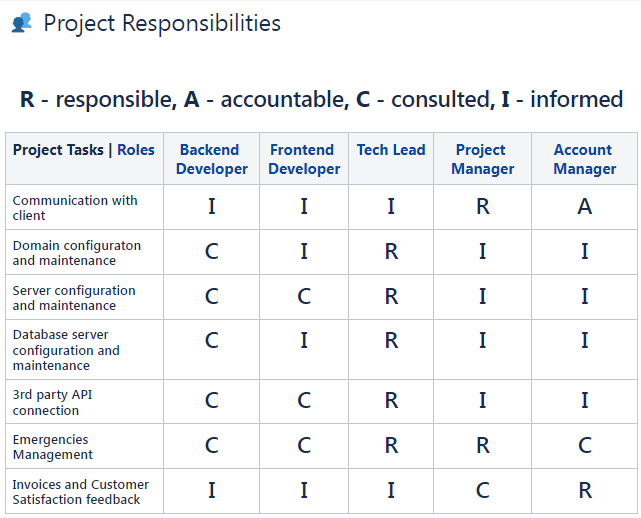
Setting Project Milestones and Deadlines
Establishing project milestones and deadlines is essential for keeping the team on track, allowing for better planning, resource allocation, and progress monitoring. Clear milestones and deadlines also enable team members to prioritize tasks and manage their time effectively. Confluence and Jira both offer presets and features for setting and tracking project milestones, ensuring that everyone remains aligned with the project timeline.
Overcoming Timezone Differences
Setting clear expectations and guidelines is essential for a successful remote development team, as it ensures that everyone is on the same page and working towards the same goals. Below are must-have recommendations to effectively manage teams.
Scheduling Regular Meetings
To accommodate different timezones, schedule regular meetings at times that work for all team members, even if it requires some flexibility. This practice fosters inclusivity and ensures that everyone has an opportunity to contribute to discussions and decisions. Additionally, it is beneficial for teams to have at least one or two hours of overlap each day to communicate with other teams on urgent matters (as an addition to shared project management and wiki tools). This overlap helps facilitate real-time collaboration and problem-solving, ensuring that critical issues are addressed promptly and effectively.

Developing a Communication Protocol
Establishing a communication protocol is essential for maintaining effective communication, as it outlines the preferred channels, response times, and escalation procedures for different types of communication.
A clear communication protocol prevents misunderstandings and ensures that important messages are promptly addressed.
Encouraging Regular Updates and Check-ins
Frequent updates and check-ins help maintain a sense of connection and alignment within the team, despite the timezone differences. Regular check-ins can also help identify and resolve potential issues before they escalate, ensuring smoother project execution. One effective way to keep the team informed is through "Work in Progress" (WIP) handovers. In addition to updating Jira tickets, team members can report daily on what they have accomplished and what they plan to work on the next day. This practice not only helps maintain transparency but also enables team members to pick up where others left off or assist in addressing challenges as they arise.
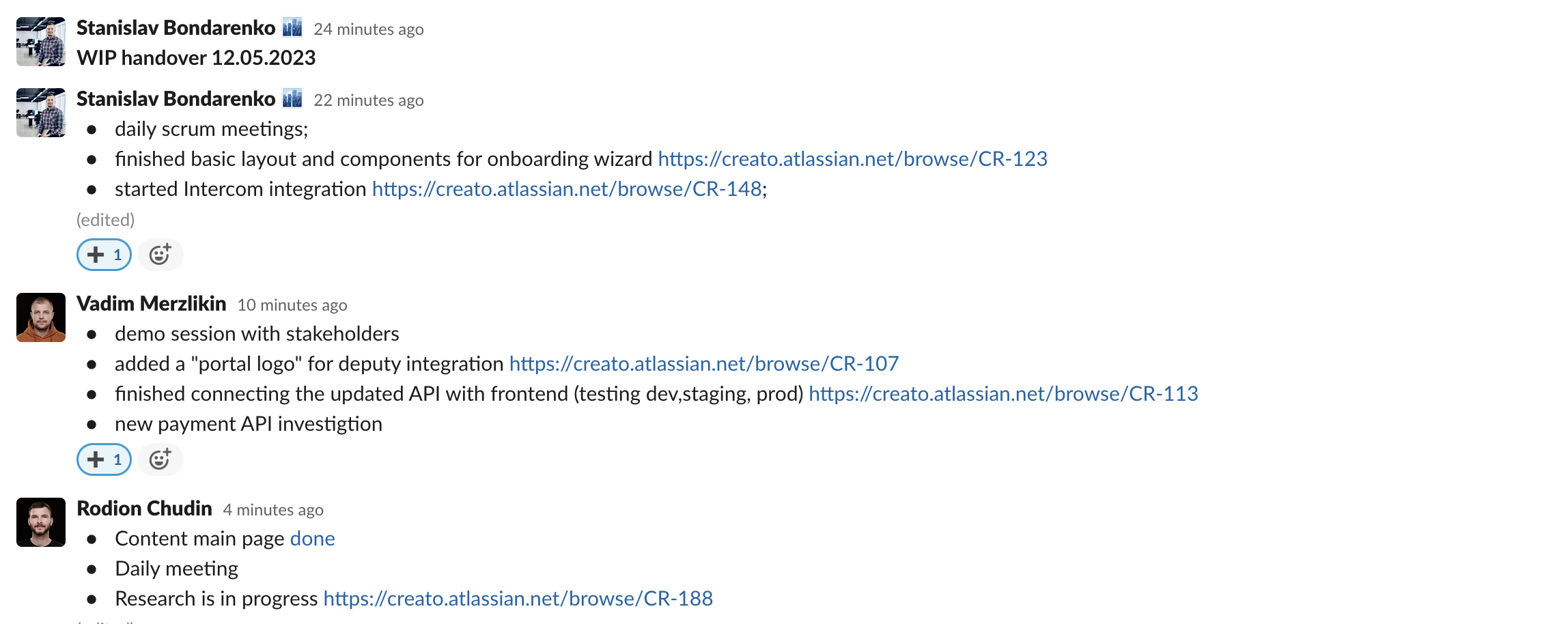
Creating a Culture of Open Communication and Feedback
Promoting a culture that encourages open communication and constructive feedback ensures that everyone feels comfortable voicing their opinions and addressing challenges. This open environment fosters continuous improvement, innovation, and a strong sense of teamwork. One way to support this culture is by conducting regular retrospectives. Retrospectives are meetings held at the end of each iteration or project phase, where team members reflect on their performance, identify areas for improvement, and discuss action items to enhance their processes moving forward. By incorporating retrospectives into your team's workflow, you can facilitate ongoing growth and ensure that the team becomes more efficient and effective with each iteration.
Making Sure Remote Teams Feel Integral to the Business
Ensuring that remote team members feel like an integral part of the business fosters a sense of belonging and commitment to the organization's success. By aligning remote teams with the same business goals and including them in company-wide activities and decision-making processes, you can enhance their motivation and engagement.
We at Uinno understand the complexities of managing remote development teams across different timezones. As a trusted partner, we take care of the entire management and communication process, seamlessly integrating large international teams or assisting small start-ups with clients around the world. Our expertise enables us to provide consulting services tailored to your specific needs, ensuring key benefits of remote team are secured.
Conclusion
Working with a remote development team in different timezones may present some challenges, but with the right strategies and tools, these obstacles can be effectively managed. In this article, we have explored various approaches to help you overcome the challenges associated with remote teams, from selecting the right communication and collaboration tools, to fostering a supportive work environment and ensuring accountability.
However, setting up and managing a remote team can be a daunting task, especially for businesses that are not familiar with the process. Fortunately, digital agencies like Uinno can provide the required setup and tackle all of these issues, committing to your project and delivering results. Working with an experienced agency that has a proven track record of managing remote teams can save you time, money, and effort, while ensuring high-quality results and efficient collaboration.
The Fast Track: Key Takeaways and Checklist
In today's fast-paced business environment, we understand that time is of the essence. If you're looking for a concise overview of the insights and recommendations discussed in this article, the Fast Track section is here to provide you with a quick and easy reference.
Key takeaways
These takeaways will help you navigate the complexities of managing a remote team and maximize the advantages.
- Remote development teams provide access to a global talent pool, cost savings, flexibility and scalability, diverse perspectives, and the ability to implement a follow-the-sun model.
- Working across different timezones can present challenges such as communication difficulties, reduced visibility, collaboration issues, cultural differences, and maintaining team cohesion.
- Effective strategies and tools for managing timezone differences include selecting the right communication and project management tools, establishing clear expectations and guidelines, scheduling regular meetings, developing a communication protocol, encouraging regular updates and check-ins, creating a culture of open communication and feedback, and ensuring that remote teams feel integral to the business.
- Digital agencies like Uinno can provide the required setup and tackle all of these issues, making it a convenient solution for businesses looking to work with remote teams and save cost.
Remote team checklist
Don’t have time to read the whole artice? By utilizing this checklist, you can systematically address the key aspects of remote team management. It serves as a valuable resource to guide you through the process of building and managing a successful remote development team, and can also be used when hiring a digital agency.
- Define roles and responsibilities: Clearly outline each team member's role and responsibilities to avoid confusion, ensure accountability, and promote efficient collaboration. Utilize Confluence templates to create and document roles and responsibilities.
- Set project milestones and deadlines: Establish clear milestones and deadlines to keep the team on track, prioritize tasks, and manage time effectively. Utilize project management tools such as Jira, Trello, or Asana to set and track project milestones.
- Select communication tools: Choose communication tools such as Slack or Microsoft Teams to facilitate real-time messaging, file sharing, and video conferencing, among other features. Ensure that all team members have access to these tools and can work on them regardless of their timezone.
- Develop a communication protocol: Establish a clear communication protocol outlining preferred channels, response times, and escalation procedures for different types of communication. This helps prevent misunderstandings and ensures that important messages are promptly addressed.
- Encourage regular updates and check-ins: Establish a practice of frequent updates and check-ins to maintain a sense of connection and alignment within the team, despite timezone differences. Utilize "Work in Progress" (WIP) handovers to keep the team informed and maintain transparency.
- Schedule regular meetings: Schedule regular meetings at times that work for all team members, even if it requires some flexibility. Ensure that there is at least one or two hours of overlap each day to facilitate real-time collaboration and problem-solving.
- Foster a culture of open communication and feedback: Encourage open communication and constructive feedback to foster continuous improvement, innovation, and teamwork. Incorporate regular retrospectives to facilitate ongoing growth and enhance team efficiency and effectiveness.
Ensure remote teams feel integral to the business: Align remote teams with the same business goals and include them in company-wide activities and decision-making processes to enhance their motivation and engagement
Success cases
Uinno is a product development agency compiled of engineers and technology experts with an ownership mindset who are solely focused on solving business challenges via creating future-ready apps, websites, and digital solutions.
United Kingdom
Kingston upon Thames, 145 London Road
Estonia
Tallinn, Tornimae 5
Ukraine
Lviv, Hazova St. 7, Seven-G
Ukraine
Zaporizhzhia, Sobornyi 160
USA
447 Broadway 2nd floor
New York, NY 10013
USA
78 SW 7th St,
Miami, FL 33130
+380 (99) 455 99 91
contact@uinno.io
hr@uinno.io



